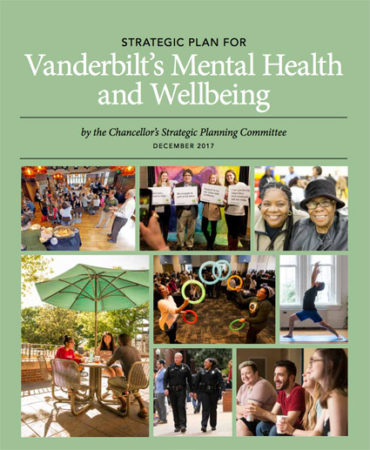 Enhanced and expanded mental health resources, collaborative research efforts and a supportive campus culture are among the key recommendations released March 22 in the Strategic Plan for Vanderbilt’s Mental Health and Wellbeing by the Chancellor’s Strategic Planning Committee.
Enhanced and expanded mental health resources, collaborative research efforts and a supportive campus culture are among the key recommendations released March 22 in the Strategic Plan for Vanderbilt’s Mental Health and Wellbeing by the Chancellor’s Strategic Planning Committee.
“I’m grateful to the committee for this extensive report. Their dedication underscores Vanderbilt University’s commitment to supporting the mental health and wellness of our students, faculty and staff,” Chancellor Nicholas S. Zeppos said. “We are doing more on all fronts—strengthening our network of support services, reducing the stigma around mental illness, and finding new treatments. The committee’s work provides a number of ways where we can continue to push forward to provide better support for all members of our community and to advance our understanding of mental health and mental illness.”
Zeppos formed the committee in September 2016 to develop a strategic plan for campus efforts on mental health and wellbeing over the next five to 10 years. Donald Brady, senior associate dean of graduate medical education in the School of Medicine, and Velma McBride Murry, Lois Autrey Betts Professor in Education and Human Development at Peabody College, chaired the committee, which included faculty, students, staff and alumni. The committee held town halls and listening sessions for faculty, staff and students and also used data from campus surveys.
“Vanderbilt is poised to become the national leader in innovative approaches to promote the wellbeing of all of its constituents, the discovery of new treatments and approaches to mental illness, and the development of a stigma-free, inclusive environment dedicated to pursuing optimal mental health for all members of our community,” the 46-page report says. “As students, staff, faculty and administration, we must own our collective and individual roles in Vanderbilt’s efforts to move its citizens on this path toward optimal mental health and wellbeing. Our hope is that this document will provide a road map to guide our journey to creating a campus culture of wellness.”
“We are doing more on all fronts—strengthening our network of support services, reducing the stigma around mental illness, and finding new treatments. The committee’s work provides a number of ways where we can continue to push forward to provide better support for all members of our community and to advance our understanding of mental health and mental illness.”
~Chancellor Zeppos
The committee framed its work and recommendations into four areas: the entire Vanderbilt community; students; faculty and staff; and culture change. The report recommendations include: expanded access to care, more providers and culturally competent services, improved awareness of existing services, broadened training to help reduce stigma, and ramping up Vanderbilt’s already strong research and discovery in mental illnesses and wellbeing.
“I greatly appreciate the committee’s insights and recommendations to advance our shared visions, and I’m excited to note that our efforts in this area are ongoing and wide-ranging,” said Provost and Vice Chancellor for Academic Affairs Susan R. Wente. “We’re preparing for the summer launch of our enhanced and integrated University Counseling Center that will be part of the Student Care Network and facilitated by a new Office of Student Care Coordination. And last week, we announced the hiring of leading neuroscientist Lisa Monteggia as the new director of the Vanderbilt Brain Institute. The institute is one of Vanderbilt’s flagship trans-institutional research and education initiatives focused on supporting mental health and wellbeing by working to reveal the causes of mental illness, understanding neurodiversity and discovering personalized treatments and cures.”
Wente noted that the university will continue to build on the excellent work being done by the brain institute along with the Vanderbilt Center for Addiction Research, the Vanderbilt Center for Neuroscience Drug Discovery, the Vanderbilt Genetics Institute and the Vanderbilt Kennedy Center.
Serving on the chancellor’s committee were:
- Donald Brady, School of Medicine, co-chair
- Velma Murry, Peabody College of education and human development, co-chair
- Stephanie Brooks Barger, MDiv’06, EMBA’15
- Dominique Behague, College of Arts and Science
- Lyn Bingham, Blair School of Music
- G.L. Black, Office of the Dean of Students
- Marino Bruce, College of Arts and Science
- Kitt Carpenter, College of Arts and Science
- Gilbert Gonzales, School of Medicine
- Elizabeth Hale, graduate student
- Alyssa Hasty, School of Medicine
- Joni Hersch, Vanderbilt Law School
- Megan Ichinose, graduate student
- Madison Maderious, undergraduate student
- René Marois, College of Arts and Science
- Craig Philip, School of Engineering
- Graham Reside, Divinity School
- Monique Robinson-Nichols, Peabody College of education and human development
- Sandra Rosenthal, College of Arts and Science
- Mavis Schorn, School of Nursing
- Kiley Stokes, Campus Dining
- Tim Vogus, Owen Graduate School of Management
- August Washington, Vanderbilt University Police Department
- Anita Wilhlem, Development and Alumni Relations